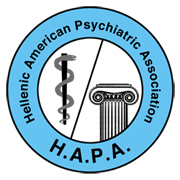Minutes of the HAPA Sixth Annual Meeting
5/24/05 Atlanta, Georgia
NOTE:The draft of the 2005 Minutes was approved by the HAPA executive committee. It will be ratified at the 7th HAPA Annual Meeting in Toronto Canada on May 23rd 2006.
Members Present: Drs Lyketsos, Latoussakis, Lymberis, Papakostas, Vidalis, Georgiopoulos, Gatos, Rougas, Albright, Zachariadis, Kachoris, Petrides,Kentros, Karagon, Agallianos,Stratas, Papastrat, Tourlentes.
Members unable to attend: Drs Kalogerakis, Cassimatis, Zaphirapoulos, Cardasis.
(1) President’s Report
HAPA President Dr. Lyketsos opened the meeting at 7:00PM.
He noted that this is his last meeting as HAPA President and thanked all of the members of the executive committee for their help and support during his term of office
(2) HAPA 2004 Annual Meeting Minutes
Dr Lymberis presented the minutes of the HAPA 2004 Annual Meeting in NYC . The minutes are posted on the HAPA Website. They were approved as written with minor corrections.
The minutes of the 2004 First joined HAPA-HPA Business Meeting in Kos, Greece were presented. The minutes are on the HAPA Website. They were approved as written.
Dr Lymberis noted that in 2006 the 19th Pan Hellenic Psychiatric Congress will take place in Athens on May 2006. Details are expected soon. She recommended that HAPA should participate and plan for a Second Joined HAPA-HPA meeting.
(3) President’s Elect Report
Dr Petrides noted that he was successful in obtaining CME credits for the HAPA scientific presentations for the HAPA meetings starting with the present meeting of 2005. HAPA members expressed their appreciation to Dr Petrides for making the CME credits a reality.
(4) Membership Report
Dr Lymberis reported on the resignation of our long time HAPA officer and Membership Chair Dr Cardasis. Dr Cardasis has served with distinction since the founding of HAPA as an officer and Chair of membership Committee. He will remain an active member of our organization. Dr Lymberis expressed her personal thanks for his various and significant contributions during all of these years. The resignation was accepted with gratitude and recognition for his service to HAPA. There was discussion about his replacement.
Dr Lymberis proposed that based on our experience over the last 6 years, it would be best if, for the time being, the new Treasurer could also function as Membership Chair. This will allow for the coordination of dues collection and membership.
ACTION: After discussion, the motion that the HAPA Treasurer will also act as the Chair of the HAPA Membership Committee was approved unanimously.
(5) Treasurer’s Report
Dr Latoussakis noted that he was successful in opening a new bank account for HAPA in the east coast. Dr Wang transferred the HAPA funds from the old account in New Mexico.to the new one. The new account has lower fees which will help us at this time since HAPA’s finances are at a low point as was noted in his report:
INCOME
1. Balance from the previous HAPA Account
$ 6,531.02
(Dr. Wang will transfer the funds)
2. Dues collected in 2005: $ 1,070.00
TOTAL INCOME: $ 7,601.02
EXPENSES
1. 2005 HAPA Annual Meeting (food/hotel) $ 2,241.72
2. 2005 Meeting/secretarial costs $ 250.00
3. Postage: $ 250.00
4. A/V Equipment (2005 Meeting) $ 250.00
5. CME Accreditation (2005 Meeting) $ 500.00
TOTAL EXPENSES: $ 3,491.72
HAPA Account balance as of 8/2005 $ 4,109.30
(6) Hellenic Psychiatric Association Report
News from Greece were presented by Drs Christodoulou and Vidalis. Dr Christodoulou was unable to come to the meeting because of his involvement in various WPA-APA meetings which conflicted with HAPA.. He provided the following information about a variety of meetings in Greece.
In March 2005 Dr Christodoulou organized a very successful WPA Congress in Athens, Greece. This was the First Intersectional Congress and also the First Electronic Congress in the history of the WPA.
Presently, he is organizing the 19th Pan Hellenic Congress of Psychiatry scheduled for May 4 to 8, 2006 at the Athens Hilton Hotel. At this meeting the 20th anniversary of the establishment of the Hellenic Psychiatric Association will be celebrated. Dr Christodoulou extended a warm welcome to all HAPA members to this Congress. Information for registering and for program details is on the website of ERA Ltd, the administrating organizers for the Congress: http://ww.era.gr/19Psychiatriccongress or http://ww.era.gr
You can also contact them by e-mail: info@era.gr or by phone.: +30 210 363 4944 and fax:+30 210 363 1690,
Dr Vidalis has been very active in the north of Greece. He is working on developing the psychiatric community of Thessaloniki as yet another major center for Greek Psychiatry. He gave a very interesting report on a number of exciting psychiatric meetings that he has been organizing.
Dr Vidalis helped organize the 2nd World Congress on Quality in Clinical Practice in June 2004 in Porto Carras, Halkidiki, Greece: http://www.qolcongress.gr. The Congress was under the auspices of the “”Pan-Hellenic Society of General Hospital Psychiatry””. The meeting attracted international interest with over 450 participants from Greece and all over the world.
Most importantly Dr Vidalis is now organizing the 3d World Congress on Quality in Clinical Practice scheduled for 28th of September to 1st of October 2006 in his home city of Thessaloniki. The international attendance in this meeting is expected to be much higher. They are expecting over 1000 participants.
The Pan-Hellenic Society of General Hospital Psychiatry has also organized a series of educational workshops on the theme “”THE FOUR SEASONS OF PSYCHIATRY””. In September 2005 the first workshop of this series took place on the island of Santorini. The 2nd workshop is scheduled for January 2006 in Kavala. The workshop will focus on the following: a) “”Side effects of psychopharmacology””, b) “”Antipsychotic medication in aged population””, and c) “”New data in antipsychotic therapy””.
The Pan Hellenic Society of General Hospital Psychiatry had its 3d Pan Hellenic Congress in January 2005 in Thessaloniki. More than 700 psychiatrists from all over Greece participated. Presently the 4th Pan Hellenic General Hospital Congress is scheduled for the spring of 2007 in Thessaloniki, Greece. Dr Vidalis requested that HAPA consider becoming a cosponsor for this meeting. The proposal was discussed.
ACTION: It was voted unanimously that HAPA become a co sponsor of the 4th Pan Hellenic General Psychiatry Congress in 2007 in Thessaloniki. It was noted that this cosponsoring does not involve any financing from HAPA.
Dr Vidalis also reported that the Pan-Hellenic Society of General Hospital Psychiatry also publishes the “”Hellenic Psychiatry of the General Hospital Journal””. He urged members of HAPA to send articles for inclusion in the journal, see website: http://www.psychiatryjournal.gr.
(7) Election of HAPA officers 2005-2008
Dr Petrides presented the report of the Nominating Committee for HAPA officers during his term of office 2005-2008
HAPA President Elect: Emmanuel Cassimatis, MD
HAPA Secretary: George Papakostas,MD
HAPA Treasurer: Vassilis Latoussakis,MD
HAPA Councilor: Athanasios Vidalis, MD
Nominations from the floor were opened. There were no further nominations from the floor.
ACTION: The nominations were accepted unanimously as submitted.
(8) Scientific Program
This year’s presentations were excellent. Each presentation generated a lively discussion. Summaries of the bios of the speakers and their presentations follows:.
The first presentation was by our HAPA member from Harvard Medical School George I. Papakostas, MD.
George I. Papakostas is an Assistant Professor of Psychiatry at Harvard Medical School and Clinical Assistant in Psychiatry in the Department of Psychiatry at Massachusetts General Hospital, Boston, Massachusetts. He is also a Staff Physician and Psychiatric Consultant for the Neuroendocrine Unit in the Department of Medicine at Massachusetts General Hospital.
Dr Papakostas received his B.A. degree in Mathematics and Chemistry from New York University (N.Y.U.) in 1994, and his M.D. degree from N.Y.U. in 1998. He then completed an Internship year in Internal Medicine at Carney Hospital, an affiliate of the Tufts University School of Medicine, in 1999 and his residency training in adult Psychiatry at the combined Massachusetts General Hospital and McLean Hospital training program in 2002.
The focus of Dr Papakostas’ research includes the pharmacotherapy of treatment-resistant major depressive disorder (MDD), including the role of individual symptoms, symptom clusters and syndromes in the treatment of MDD, and the study of neuroendocrine and metabolic issues in MDD with a particular emphasis on their relevance to clinical improvement during pharmacotherapy.
Dr Papakostas has received numerous national and international research awards from sources including the American College of Neuropsychopharmacology (ACNP), the Collegium Internationale Neuropsychopharmacologium (CINP), the New Clinical Drug Evaluation Unit (NCDEU) of the National Institute of Mental Health (NIMH), the World Federation of Societies of Biological Psychiatry (WFSBP), the International College of Psychosomatic Medicine (ICPM) and the American Foundation for Research Prevention (AFSP). He is an author or co-author of over 80 clinical and scientific publications and book chapters.
He presented research data on a topic that in recent years has generated a lot of public interest:
The role of folate in the treatment of depression
Dr Papakostas presented data from current research on the role of various folates, including SAMe in the treatment of major depression
The second presentation was by Lisa Aronson, M.S.W., J.D., Ph.D. Director, Center for the Study of Mind and Human Interaction University of Virginia, Charlottesville
Since September 2002, Dr. Aronson has been Director of the Center for the Study of Mind and Human Interaction (CSMHI), University of Virginia, School of Medicine; Assistant Professor of Psychiatric Medicine and Pediatrics, University of Virginia; and Editor of Mind and Human Interaction. CSMHI is developing the following programs: “Understanding and Addressing the Transition from Adolescence to Young Adulthood in Severely Stressed Societies” and capacity enhancing programs for human rights groups.
Dr. Aronson’s educational background is in law, clinical psychology and social work. Between 1976 and 2002 she worked as psychotherapist for children, adolescents and families (primarily) and for adults (secondarily). She worked clinically with communities, children and families affected by traumatic events as Director of Child Evaluation, Trauma Psychiatry Service, U.C.L.A. from 1995-2001. She served as a consultant to mental health professionals in Turkey following the 1999 earthquake (sponsored by the American Jewish World Service) and Central America following Hurricane Mitch (sponsored by the Pan American- World Health Organization).
Selected recent publications include:
Gonzalez, A.M., Aronson, L.(2003).Community, identity, and land in Huatulco, Mexico. In Mind and Human Interaction, 13: 120- 131.
Aronson, L.(2004).Social work consultation to mental health workers serving children and families affected by disasters. In J. Berzoff, P. Silverman (Eds.), “ Living With Dying: A Social Work Textbook in End of Life Care” . New York: Columbia University Press.
Dr Aronson presentation was an application of the work of the Center on the current conflict involving Cyprus:
Border Psychology: The Case of Cyprus
Since 1974, there has been a de facto border in Cyprus between north and south.
There is a general preoccupation with the border that is contaminated by psychological factors.
This presentation will discuss how, under stressful conditions, physical borders take on psychological meanings. They become more than barriers separating territories rather, they become like a second skin that contains the large-group identity. When shared anxiety and consequences occur, questions about borders (and intrusions upon them) become questions of identity. When groups in conflict are under stress, ensuring the stability of physical borders may provide the necessary space and time to “play” with perceived threats to a group’s identity and allow psychological adaptations to take place without provoking violence and further conflict.
This presentation will be based on studies of the Center for the Study of Mind and Human Interaction’s and Dr. Vamik Volkan’s pioneering work in the field of large group psychology.
CME Questions
1 What is “large-group identity”?
2 What are the psychodynamics of societal coexistence, integration, or absorption?
3. Why does the individual adhere to his/her large group identity under severe societal stress?
The website for the Center is http://www.healthsystem.virginia.edu/internet/csmhi/
(9) Introduction of the New HAPA President
Dr Lyketsos thanked Dr Petrides for his support during his term of office as HAPA President and welcomed him as the next HAPA President.
Dr Petrides discussed his priorities for his term of office. He stressed that his first priority is strengthening the organization. To this end he will initiate monthly executive committee conference calls to be scheduled for the last Monday of each month 5:00PM EST. He also views increasing the membership of HAPA as a major goal: “We need to focus on the US HAPA members and reach out to psychiatrists of Greek origin here at home as well as in Greece”. He encouraged everyone to get the word out for the meetings of HAPA in 2006.
The next HAPA Annual Meeting will take place in Toronto Canada in connection with the APA Annual Meeting in May 2005. The HAPA-HPA joined meeting will be in Athens as part of the 19th Pan Hellenic Psychiatric Congress in May 06 prior to the APA meeting.
The meeting was adjourned at 10:30PM
See you all in Toronto in May 2006
Respectfully Submitted
Maria T. Lymberis, MD
HAPA Founder & Past President
“



